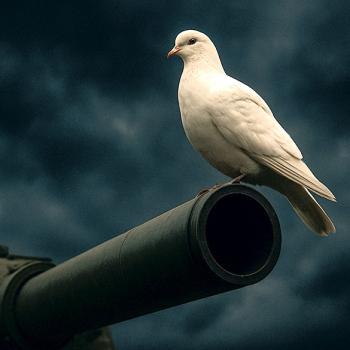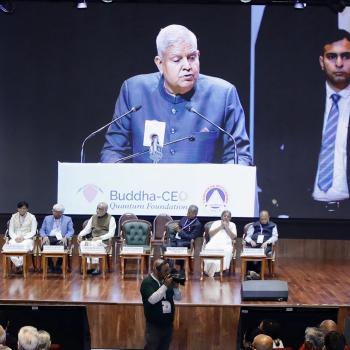Editors' Note: This article is part of the Patheos Public Square on Engaging the New Year. Read other perspectives here.
2015 ended with a bang for me when a Chevy Suburban plowed into the side of my car on New Year's Eve. The driver made an illegal U-turn in the middle of a busy Washington, DC street, but wanted to pin the blame on me. As I sat in my cocktail dress contemplating his hubris and the injustice of being blamed for his recklessness, a group of #BlackLivesMatter protesters came marching up the street. It was surreal.
In the weeks leading up to the crash, I learned that human error had robbed me of my meager retirement savings and that a 39-year-old cousin had died. I also celebrated my 30th wedding anniversary and saw the successful outcome of a major work project.
As 2016 dawns, I feel a familiar mixture of hope and dread. The new year will no doubt include more of the same: joy and sorrow, gain and loss, work and rest, success and failure. This is why I don't make New Year's resolutions. They promise that life will be dramatically different, that I will be different, and I know it won't and I won't.
Instead I allow the liturgical rhythms of my church tradition to break through the way society pressures me to measure time and life itself. Advent, Christmastide, Epiphany, Ordinary Time, Lent, Eastertide, Pentecost, and a few special days in between guide me into an alternative reality that prioritizes anticipation, celebration, joy, lament, faithfulness, and Spirit-empowered living over self-improvement, achievement, bodily perfection, and other modern notions of success.
Far from being the "dead tradition" that the low-church communities of my youth had labeled high church tradition, the Anglican liturgy never fails to reorient and renew me. In a decade of Anglican worship, I've never tired of the ritual. Church is a safe space because I always know what to expect. Even if there is a rogue preacher or worship leader, the offender only has a few minutes to annoy me before we move on to another element of worship, and she or he is not the center of the hour. The Holy Eucharist is.
In his excellent book, Liturgical Theology: The Church as Worshiping Community, Simon Chan says, "Ecclessial communion is first and foremost an essentially Eucharistic communion. When the church is understood as essentially communion in and of the body of Christ, the primary focus of the ecclesial life is not church hierarchy [as critics assert] but koinonia characterized by agape." Fellowship characterized by love.
I take this to mean that because my church's order of service is centered on remembering the body and blood of Christ rather having its apex at the sermon, it turns priorities away from programs of self-improvement and/or socio-political action to the essence of my faith, which is communion with and worship of the triune God.
I believe in the mystery of Christ's presence in the Eucharist and am transformed as I partake of that mystery. Week by week I go into worship with my load of sin and guilt, and week by week, I leave baptized anew with the knowledge that I am one with Christ and with the worldwide and eternal communion of saints who are forgiven and empowered to walk worthy of our Christian calling.
Beyond this, "The experience of 'feeding on Christ to life eternal' anticipates the future and is also a foretaste of the future: the marriage supper of the Lamb, the healing of a broken creation, reconciliation and face-to-face communion. Eucharist is where the past and the future are effectively brought together in the present through epiclesis," writes Chan.
For me, the new year is about getting into the habit of writing the correct date on documents and thinking about a few goals that I'd like to prioritize for the coming months, but I don't measure my life by that calculus. I measure it be an eternal calculus, one that says there is time for everything — a time to live and a time to die, a time to plant and a time to uproot, a time to weep and a time to laugh, because "God has made everything beautiful in its time" and has "set eternity in the human heart." (Ecclesiastes 3:1-11).
1/13/2016 5:00:00 AM




